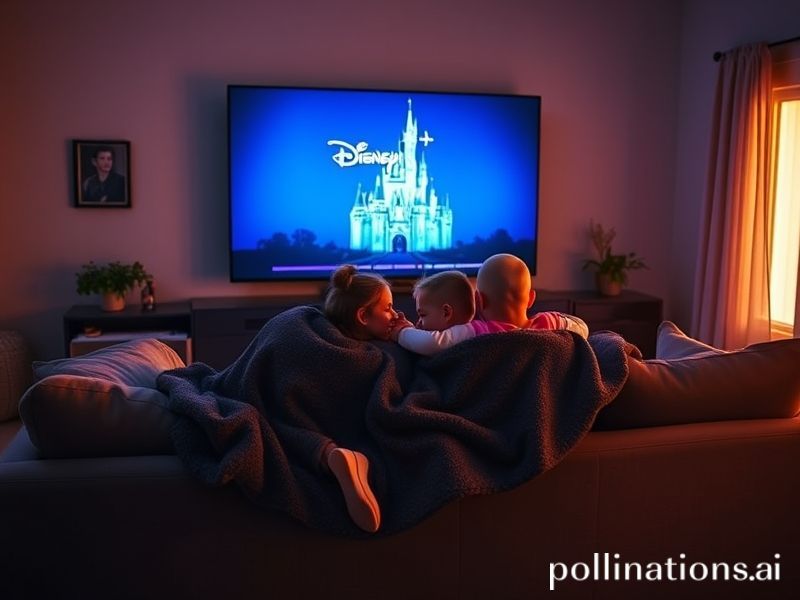The Mouse That Roared in 4K: Disney+’s Global Conquest One Toddler at a Time
The Mouse That Roared in 4K: How Disney+ Conquered the World One Toddler at a Time
SÃO PAULO—At 2:17 a.m., while most of this city’s favelas slept under flickering streetlights, nine-year-old Júlia was wide awake, clutching a cracked Android and humming “Let It Go” in Portuguese with the fervor of a Cold-War radio operator. Somewhere on the other side of the planet, an algorithm in Burbank, California, registered the stream, classified the user as “high-engagement, emerging market,” and dispatched another cheerful push notification: Frozen 3 drops in 42 days. The global conquest continues, one sleepless child at a time.
Disney+ turns five this November, a milestone marked less by birthday cake than by balance sheets tallied in a dozen currencies. In that short half-decade, the service has metastasized from a plucky Netflix understudy to a geopolitical force wearing mouse ears. It now reaches 150 million households across more than 100 countries, which is diplomatic speak for “we know what your kids want before you do.” The House of Mouse has effectively issued passports to its own micro-nation of captive eyeballs, where citizenship requirements are an internet connection and a willingness to surrender bedtime.
The expansion playbook was ruthlessly cheerful. Phase one: storm North America with Baby Yoda memes and nostalgic millennials who still believe The Lion King is a documentary. Phase two: parachute into Europe, where regulators furrow their brows over cultural quotas while simultaneously binge-watching WandaVision. Phase three: colonize Asia-Pacific, a region that contributes nearly 40% of new subscribers, aided by cut-rate mobile-only plans calibrated to local GDPs. The strategy is equal parts economic miracle and cultural carpet-bombing, wrapped in the reassuring lullaby of “it’s only entertainment.”
But nothing in life is free except maybe oxygen—and even that’s getting privatized—so consider the hidden transaction. In Jakarta, a mother skips a second meal so her twins can stream Moana in Bahasa. In Lagos, shared passwords ricochet through WhatsApp groups like digital contraband. Meanwhile, Disney’s annual report brags of “ARPU optimization” (average revenue per user), which is accountant-speak for squeezing blood from stones that haven’t yet learned to complain. The magic, it turns out, is simply compound interest wearing a tiara.
The geopolitics are equally cartoonish. The service launched in South Africa in mid-2022, conveniently timed to distract from rolling blackouts. It debuted in the Middle East with Aladdin pre-loaded—subtlety never was a corporate virtue—while in India, Disney+ Hotstar piggybacks on cricket broadcasts like a remora on a very lucrative shark. Each new territory triggers a miniature culture war: local creatives beg for shelf space, nationalist politicians demand “authentic representation,” and Disney nods sympathetically before green-lighting another Marvel spin-off set in a green-screen New York. Everyone wins, especially the accountants.
Of course, the real product isn’t content; it’s habit. Behavioral scientists—Disney employs an unsettling number of them—refer to the “ritual loop”: child opens app, child sees familiar castle, dopamine fires, tantrum averted, parent caves on monthly fee. Multiply by a billion micro-loops and you have obedience training on a planetary scale. Or, as the investor call put it, “exceptionally sticky engagement metrics.” Same difference.
Resistance exists, though it’s quaint. France slapped Disney with a 5% tax to fund domestic cinema, which the company offset by raising subscription prices—liberté, égalité, monetarité. China still refuses to let the mouse inside the Great Firewall, proving that even totalitarian regimes fear the soft power of singing snowmen. And in Russia, the service shut itself down in 2022, a rare moral stance that lasted exactly until shareholders asked why Moscow’s rubles weren’t converting into Anaheim’s yachts.
As dawn breaks over São Paulo, Júlia finally passes out, thumb still warm on the screen. The credits roll on Encanto for the fourth time today, the algorithm queues up Coco as a chaser, and somewhere a quarterly earnings target edges closer to the green. The globe spins, crises flare, currencies collapse, but the castle logo remains—a digital hearth around which humanity huddles, paying rent to an immortal rodent in a tuxedo. And the most chilling part? We queued up for this happily ever after ourselves.







